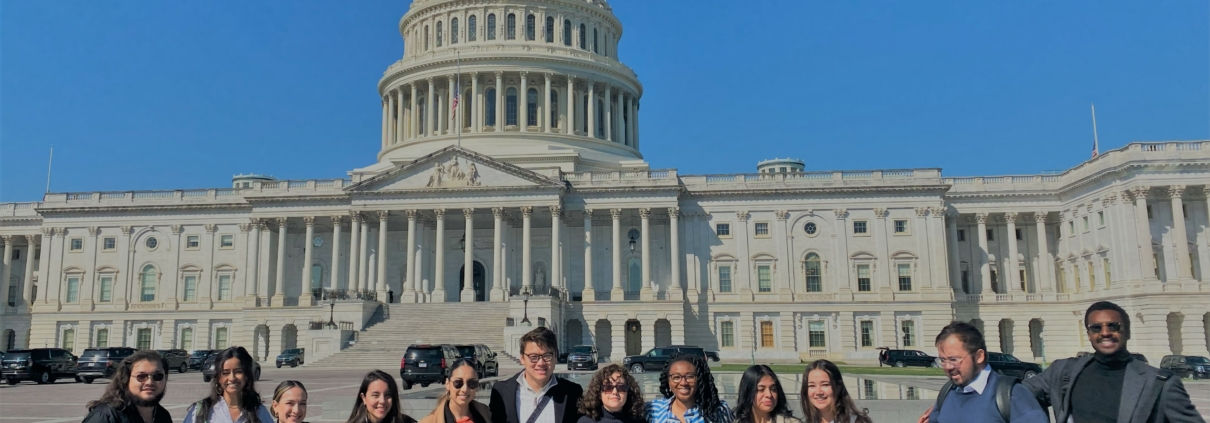Reflections on Careers in Global Public Affairs
By: Lucy Briggs, Sebastian Cazares, Myrella Gonzalez, Akib Rahman
A weeklong excursion to Washington, D.C. to learn about career opportunities in Global Public Affairs with fellow Luskin students revealed the variety of paths that public affairs students can take after graduation.
Our hosts came from all walks of life, focusing on everything from electric transportation to anti-corruption efforts. One speaker that stood out in particular was Rebecca Schaeffer with Fair Trials. Working on the Federal level, Fair Trials tackles structural racism and mass incarceration alongside grassroots movements, organizers, and nonprofits. Rebecca focused on the ways that US carceral policies are exported overseas, despite the US prison system being the “most expensive failure in the world”. She discussed how policies such as plea bargaining, incommunicado detention, and criminal codes are spread from the US to other countries around the world. As a participant in the MURP student-led abolition course in Fall quarter, it was inspiring to see discussions of abolition and movements against mass incarceration on the federal level. Additionally, as planners we often focus on the fine-grain issues within cities, so it was valuable to see how these same issues impact the global scale.
From a Masters of Public Policy Perspective, it was an exciting adventure to see the potential of collaboration between our field of study, Urban Planning, and Public Affairs in general. The scope of advocacy possible in a worldwide context compared to what we usually see in Los Angeles or California was eye opening. We had a variety of experiences, like seeing work within the U.S. Government level in D.C., to institutions that operate on an international level on a more Non-Governmental Organization (NGO) type of framework through agencies that traditionally are associated with the United Nations (UN). However, it was exciting to see representation from leaders who are challenging the status quo and demanding radical change. Our selected students asked tough questions and addressed controversies in relation to social injustice, imperialism, global corporatism/colonialism, and were able to connect with folks who lead organizations like Climate Justice Alliance. This organization called out capitalism and systems of supremacy and wanted an intersectional, radical, climate justice movement. To see organizations like these when institutions of higher ed often support the status quo was a refreshing experience.
In conclusion, the weeklong excursion to Washington, D.C. was a transformative experience for the Luskin students who participated. It provided an opportunity to see the different career paths available in global public affairs and to learn about the advocacy work being done at the federal and international levels. The trip was also valuable for highlighting the potential for collaboration between urban planning and public policy fields in addressing global challenges. The speakers we met, including Rebecca Schaeffer with Fair Trials and leaders from Climate Justice Alliance, inspired us with their commitment to challenging the status quo and demanding radical change. The excursion was a reminder of the importance of being engaged in advocacy work, both locally and globally, and of the power of collective action in creating a more just and equitable world.




